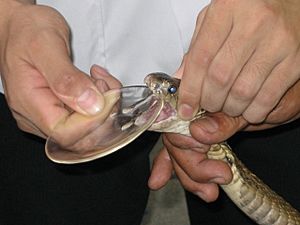Antidote facts for kids
An antidote is a special chemical or medicine. It helps to stop or reverse the bad effects of a poison. Think of it as a helper that makes the poison's damage go away. Each antidote is designed to work against specific poisons.
Not every poison has an antidote. For example, a very strong poison called aconitine has no known antidote. Aconitine comes from a plant called Aconitum. If enough of this poison gets into a person's body, it can be deadly.
Contents
Examples of Antidotes
Activated Charcoal
Activated charcoal can be used as an antidote for many poisons. However, it only works for poisons that were swallowed. For example, activated charcoal can help with some types of poisoning. The charcoal acts like a magnet. It attaches to the poison in the stomach. This stops the poison from being absorbed into the bloodstream.
Activated charcoal does not work for every kind of poison. For instance, it will not work for alcohol, strong acids, or products made from petroleum. These include things like paint thinner or fuel oil.
Antivenoms
Antivenoms are special medicines. They fight the poisonous effects of bites from venomous animals. These animals make venom, like some snakes and spiders.
To create some antivenoms, a tiny bit of venom is injected into an animal. Often, a horse is used for this. The animal's immune system then creates special helpers called antibodies. These antibodies tell other immune cells to destroy the venom. Later, these helpful antibodies can be taken from the animal's blood. They are then used to make an antivenom. When this antivenom is given to a person bitten by a venomous animal, their body already "knows" how to fight the venom.
Atropine
Sometimes, antidotes can be poisons themselves. For example, atropine is a very poisonous substance. It is found in a plant called deadly nightshade. However, atropine is used as an antidote against some insecticides. It also works against certain kinds of nerve gas.
Atropine is carried on many ambulances. This is because it has other important uses. For example, it can help restart a heart that has stopped beating.
There is a product called DuoDote. It combines atropine with another medicine called pralidoxime chloride (2-PAM). Both medicines are antidotes for some insecticides and nerve gases. DuoDote is given by injection into the thigh muscle. It comes in an auto-injector, which looks like a large pen. When its safety cap is removed and it's pushed against the thigh, it automatically injects the medicines. Special teams that treat poisons often carry DuoDote.
Ethanol
Ethanol can be used as an antidote. It helps people who have been poisoned by ethylene glycol. Ethylene glycol is a chemical found in antifreeze. It tastes very sweet. Because of this, children and animals sometimes drink it by accident. They don't realize it is a poison.
Ethanol also works as an antidote for methanol poisoning. Methanol is sometimes called "wood alcohol." It is also used in antifreeze, fuel, and solvents. People can get methanol poisoning by accident. This can happen if it gets on their skin or if they breathe it in. Methanol is also poisonous if swallowed.
Ethanol works by attaching to these poisons, ethylene glycol and methanol. Once the ethanol is attached, the kidneys can remove the poisons from the body through urine.
Another medicine called fomepizole is also an antidote for ethylene glycol and methanol poisoning. It works in a similar way to ethanol.
Oxygen
100% (pure) oxygen is an antidote for carbon monoxide poisoning. Carbon monoxide is a dangerous gas you cannot see or smell. If pure oxygen is not enough, a special treatment called hyperbaric oxygen therapy (HBOT) can be used.
HBOT is done in a special tube or room. This room is called a hyperbaric chamber. It is built to handle high pressures. Inside, 100% pure oxygen is given to the patient to breathe. The air pressure inside the chamber is increased. It can be up to three times more than normal air pressure. This helps the lungs take in much more oxygen. It also makes it easier for the blood to carry more oxygen to the whole body.
Vitamin K
Vitamin K is an antidote for warfarin (Coumadin) poisoning. Warfarin is a medicine that makes the blood thinner. It is used to prevent blood clots. However, if a person takes too much warfarin, their blood can become too thin. When blood is too thin, it cannot clot properly. This can cause serious bleeding problems.
The blood needs vitamin K to be able to clot. When a person has warfarin poisoning, giving them vitamin K can help their blood clot normally again.
It takes vitamin K about four to six hours to reverse warfarin poisoning. If a person with warfarin poisoning is bleeding, doctors might also give them fresh frozen plasma. This works more quickly to make the blood less thin.
See also
 In Spanish: Antídoto para niños
In Spanish: Antídoto para niños
 | Selma Burke |
 | Pauline Powell Burns |
 | Frederick J. Brown |
 | Robert Blackburn |


